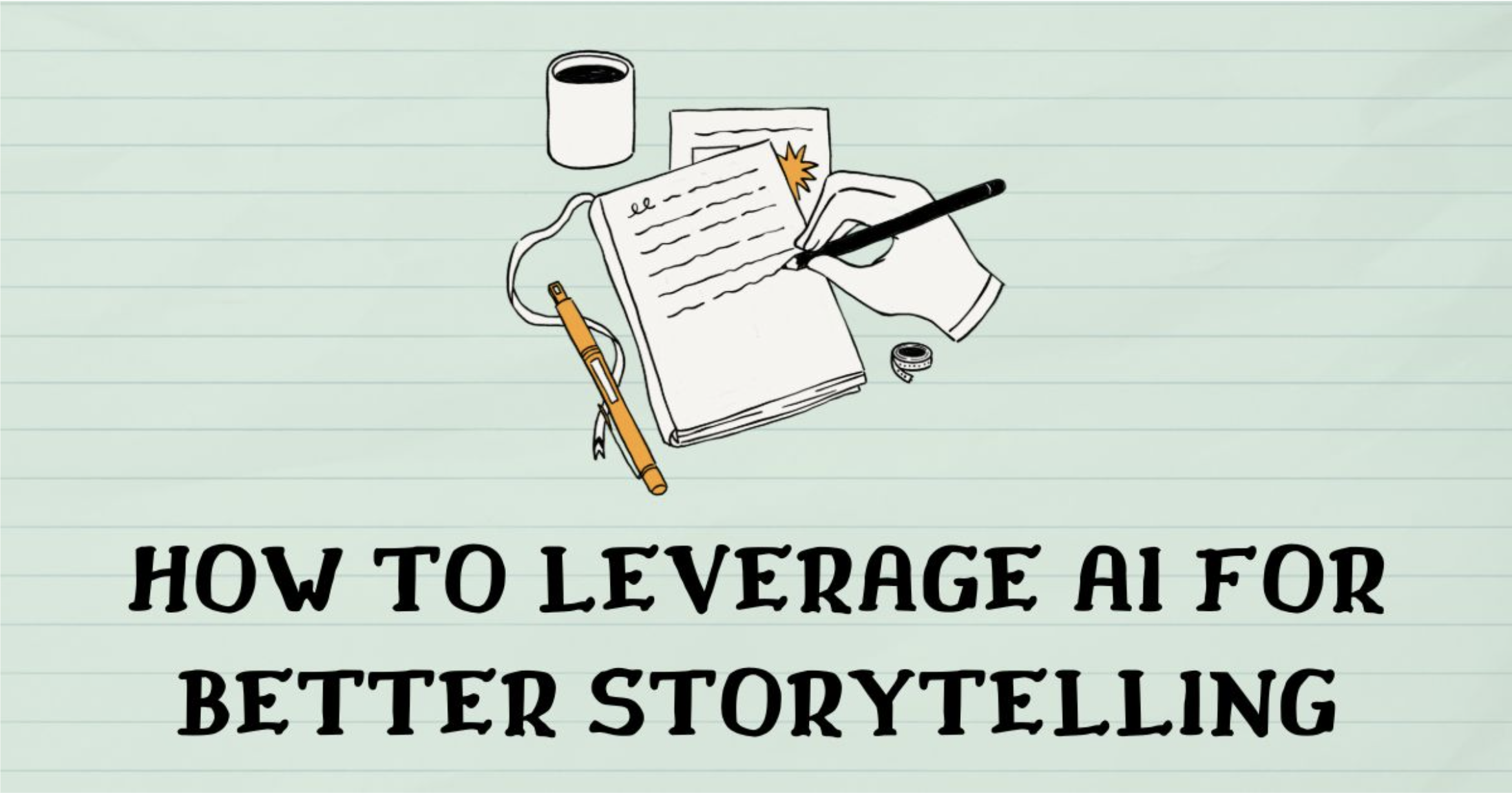How to Leverage AI for Better Storytelling?
With the fast-moving world of content creation, AI for storytelling is literally changing the game for writers and creators alike. Now, whether you’re an author, screenwriter, or content creator, learning to leverage AI-powered tools takes your storytelling to the next level. From idea generation to plot development, AI is providing unparalleled support that will enable you to craft more engaging, original, and personalized stories. In this article, we’ll explore how to use AI to enhance your storytelling, boost creativity, and improve your writing efficiency.
1. Understanding AI in Storytelling
AI storytelling is the application of algorithms and machine learning models in order to aid a writer in writing, refining, and developing stories. These tools include AI story generators and poem makers, which work with gigantic datasets to understand the progress of story structure, character development, and plot development all through the power of natural language processing. Such tools can generate ideas, refine the flow of your writings, and even produce a passage of text predicated on your ideas.
Popular AI writing tools include:
AI Story Generators –Tools that assist writers in developing elaborate plotlines, well-rounded characters with distinct personalities, and natural-sounding dialogue to make their stories interesting. Want to try it for yourself? Click here to access one of the most advanced AI story generators.
Poem Generators – AI that aids in composition by providing inspiration and word play suggestions. Click here to try the AI Poem Generator and unleash your creativity.
Language Models – Tools that analyze and optimize your existing content for tone, style, and readability. For more information, just click here.
2. Benefits of Using AI for Storytelling
Idea Generation
AI keeps you away from an often-scary blank page by giving you creative ideas for your concepts and proposals. You may be writing a novel, screenplay, or blog post; AI helps brain-wave for as little as just a few minutes before fine-tuning your concepts.
Plot Development
Available now are AI tools which can create plots for different genres or thematic interests. Given some basic information about your story, it can even suggest plot twists and character arcs that follow the vision you have for your story. This not only saves time but also infuses it with new directions you might not have considered.
Character Creation
Creating a well-rounded character set is the key to a great story. AI can help create unique, multi-dimensional characters by suggesting backgrounds, motivations, and even personality traits. You refine these suggestions to bring your characters to life in ways that are authentic and relatable.
Dialogue Help
One of the most difficult parts of storytelling is writing natural-sounding dialogue. AI tools can examine existing conversations and make suggestions for improvements to make dialogue flow better, sound more realistic, or even match your tone. This allows for richer, more dynamic interactions between characters.
3. Using AI Tools for Creativity Enhancement
Sometimes when you’re stuck or need new directions, AI can be a great helper. Here’s how AI helps fuel your creativity:
Beating Writer’s Block: AI tools offer you prompts and sentences for creativity, giving you a fresh starting point because, when you have no idea, it will help you in deciding where to go next.
New Ideas: With AI, you can generate alternative plot developments, character motivations, or settings while experimenting with drastically different ideas you might not have thought of.
Human Imagination + AI: While AI can help create and draft, creative decisions are yours to make. You can also guide AI tools by adjusting suggestions to blend your voice and vision.
Use AI to write in new directions that you might not have thought of and thereby give you more dynamic stories that are unpredictable and captivating.

4. AI for Personalized Stories
Personalization in a digital world is the way to engage your audience. AI may be leveraged for purposes of creating personalized stories tailored towards specific groups to better connect with readers. Here is how:
Audience Insights: For example, AI-based tools will analyze your audience’s preferences and suggest changes in the tone, style, and genre of your story. While trying to write for young adults, mystery lovers, or sci-fi fans, AI can help fine-tune your work to meet the expectations of the targeted demographic.
Customizing Genres: If you write under multiple genres, AI can help vary your storytelling to fit different markets. The underlying elements-plot, character, and dialogue-always remain but only receive a form according to genre conventions and reader expectations.
Tone or style: AI may adjust the tone of your writing. It helps shift from light to heavy or formal to casual depending on context and audience.
With AI, you’ll be able to write far more personalized stories that speak directly to your readers, engaging and making them loyal.
5. Optimal Storytelling Efficiency
The other primary benefit that AI brings in storytelling is the improvement of efficiency without being compromised. Here is how AI can help you optimize your writing process:
FASTER DRAFTING: AI produces drafts and will give you suggestions that will save time for writing and editing. In this aspect, it is really helpful for writers with deadlines or a set of projects they need to finish within a period of time.
Expansion of Content: You may have an idea but lack the words to fill it out, so I can expand your outline, adding details, descriptions, and dialogues to breathe life into the story.
Error Detection: AI tools detect grammar, spelling, and punctuation errors, so you get to clean up your work with much swiftness and perfect your story in the end.
You will reduce friction and spend more time on the creative process by integrating AI into your writing workflow.
6. Ethical Considerations and Challenges in AI Storytelling
While AI has great advantages, it also calls for several important ethical questions. Here are a few considerations:
Originality and Authorship: When using AI, the content must somehow bring forth a balance of a human’s own creativity balanced with machine assistance. The authors should ensure that the personal voice is not overpowered by the AI.
Quality Control: AI tools are so potent but sometimes also result in a piece of content that may lack nuance or depth. Reviewing and refining the suggestions generated by AI ensures that they meet your standards.
Bias in AI: AI tools sometimes pass on biases from which they are trained on. The writer needs to be aware of such potential biases and work with an inclusive attitude.
With increased use of AI in writing, there will be great pressure on overcoming these challenges so that AI is responsibly and ethically used.
7. The Future of AI in Storytelling
The future of AI in storytelling looks very promising. In fact, as AI technology keeps growing, the near future may see:
Much smarter tools: AI would know more subtleties of language to provide even more customized and creative help.
Integration with other technologies: Likely, AI will integrate itself in newer technologies like AR and VR and open new ways through which these stories will be experienced.
Collaborative Writing: AI can offer even more collaborative writing experiences between humans and machines as they are writing great stories in real time.
Conclusion
As AI evolves, the future of storytelling turns out to be very exciting for writers and creators.
Leveraging AI for better storytelling offers exciting opportunities for writers to enhance creativity, streamline their workflow, and create more personalized, engaging stories. From generating plot ideas to refining dialogue, AI tools are transforming the way we craft narratives.
As AI technology continues to improve, its role in storytelling will only grow, offering endless possibilities for writers. All set to find out how AI can supercharge your storytelling? Start experimenting with AI tools today and see how they can help you tell more interesting, effective stories. Whether you’re struggling through writer’s block or fine-tuning your plot, an AI sidekick is a great investment in your writing journey.







